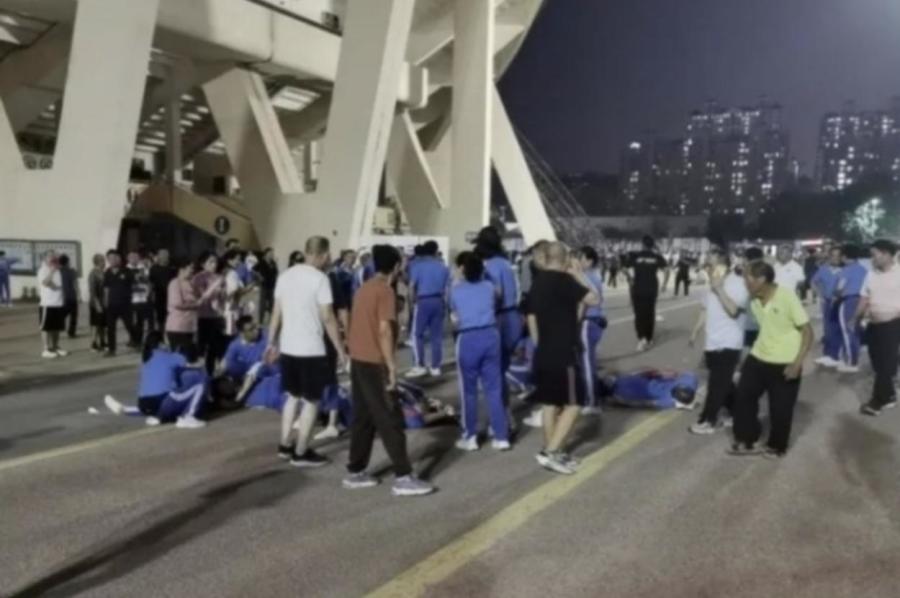The day after the car-ramming incident at the Sports Center in Zhuhai, Guangdong Province, a family member of one of the victims reported that when they signed an A4 sheet of paper to claim the body, they saw that the paper was almost completely filled with signatures, indicating that many people had died. (Video screenshot)
[People News] In November, multiple incidents of deliberate vehicular attacks targeting pedestrians occurred across China, resulting in significant casualties. Recently, additional reports have surfaced from Sichuan and Hebei of buses ramming into people and a truck colliding with a police vehicle. Scholars told Radio Free Asia that these are tragic outcomes of a deteriorating economic environment, leading to retaliatory actions and violence among the socially disadvantaged. Netizens have described the situation as: "The rampage of 'sacrificial loyalty' continues across China" and "The bowling pin revolution persists."
According to Radio Free Asia, November has been tumultuous in China, with at least three retaliatory vehicular attacks reported earlier in the month. In just the final three days of the month, at least four additional incidents of vehicles ramming into pedestrians occurred, including two involving buses.
An X account, "Yesterday," posted on November 26 about a bus collision in Neijiang, Sichuan, on November 25. A bus traveling along the Han'an Avenue and Jianshe Road intersection in Neijiang’s Dongxing District suddenly veered into pedestrians, injuring four and killing one.
Netizens questioned the official statement, which claimed the driver had a sudden medical emergency, causing the accident. Critics suggested this explanation was meant to prevent further erosion of public confidence in China.
An X account, "Daily People's Report," highlighted another bus collision incident on November 24 in Hengshui, Hebei. A bus reportedly drove the wrong way on Heping Road's central street, recklessly crashing into other vehicles. The bus first hit a white car, then a taxi. Had the taxi not blocked its path, the bus could have struck additional vehicles. Local authorities quietly suppressed information about the incident, and while there were casualties, the specific details remain unclear.
X account "Luo Xiang" shared two videos depicting public resistance. In one, a truck driver, enraged after being fined repeatedly by traffic police, reversed his truck into two police vehicles. In another video, young men riding electric scooters in Guizhou confronted traffic police, threatening to kill anyone who confiscated their vehicles, forcing the officers to back off.
X account "Li Laoshi Bu Shi Ni Laoshi" reported that on November 26 in Lanzhou, Gansu, a car suddenly accelerated into pedestrians crossing the street. While fleeing, the driver injured three more pedestrians before being apprehended. The injured were taken to the hospital for treatment.
The same account also disclosed another incident on November 26 in Beijing’s Fengtai District, where a car rammed into pedestrians. Videos of the aftermath showed a chaotic scene with injured individuals lying on the ground along the road.
These recent events follow a string of violent incidents in November: November 11: In Zhuhai, Guangdong, an off-road vehicle drove into a crowd at a sports center, resulting in 35 deaths and 43 injuries. November 16: In Wuxi, Jiangsu, a stabbing incident at a university left 8 dead and 17 injured. November 19: In Changde, Hunan, a vehicle rammed into people outside a primary school, leaving multiple students and adults injured on the ground.
Netizens Mock: "Self-Driving Vehicles," "Never-Ending Chaos," and "Numbness"
Chinese netizens have been discussing these events with a mix of outrage and sarcasm. Comments included: "Daily killings—has this become the norm in China?" and "Mass casualties every day, and yet they still shamelessly claim to be the safest country."
Others mocked the situation, referring to it as "bowling" or "self-driving vehicles," with comments such as: "Autonomous vehicles with built-in loyalty sacrifice functions," "The bowling revolution continues," "Desperate and collapsing citizens with no outlet for their emotions—ready to explode at any moment," "This is the real reason China is pushing self-driving technology," "It just never ends, does it?" "I’m numb to it now."
Some netizens compared the incidents to Zhang Xianzhong, a notorious peasant rebel from the Ming Dynasty known for his violent uprisings. Comments included: "The era of Great Xianzhong," "Xianzhong is everywhere—today, he’s roaming Lanzhou," "A daily Xianzhong sighting—here it is again," "Every day without a Xianzhong event feels incomplete," "This has to be a Xianzhong moment; otherwise, why would someone deliberately turn left into a crowd?" "Xianzhong continues to run rampant in China."
Wu Jianzhong, Secretary-General of Taiwan’s Strategic Progress Institute, told Radio Free Asia that in recent years, similar incidents involving attacks on commercial areas have occurred in cities like Nanjing, Beijing, and regions in northeastern China.
Scholar: China's Economic Decline Triggers "Zhang Xianzhong Phenomenon" and Intragroup Violence
Wu Jianzhong explained: "Within three days of such incidents, reports or videos from the scene almost completely disappear from the internet. After that, you typically see speeches from relevant officials, followed by the formation of a working group led by certain departments, which then announce measures to prevent such incidents from happening again."
Wu pointed out an observable pattern in the official death tolls reported by Chinese authorities, which rarely exceed 35. This is likely because surpassing that number would require accountability from higher-level officials.
He noted that many of the perpetrators involved in these incidents are unemployed or underemployed individuals, acting out under significant pressure. This has a clear correlation with China's stagnant economic growth.
Such events are referred to by outsiders as "retaliatory incidents." Wu Jianzhong said: "This is a situation of social retaliation. I believe it follows the logic of 'the weak attacking the weak.' For the vulnerable in society, the national safety net fails to catch them, and the state is directly the initiator causing poor economic development. These helpless and vulnerable individuals then crash into innocent pedestrians, resulting in such phenomena."











News magazine bootstrap themes!
I like this themes, fast loading and look profesional
Thank you Carlos!
You're welcome!
Please support me with give positive rating!
Yes Sure!